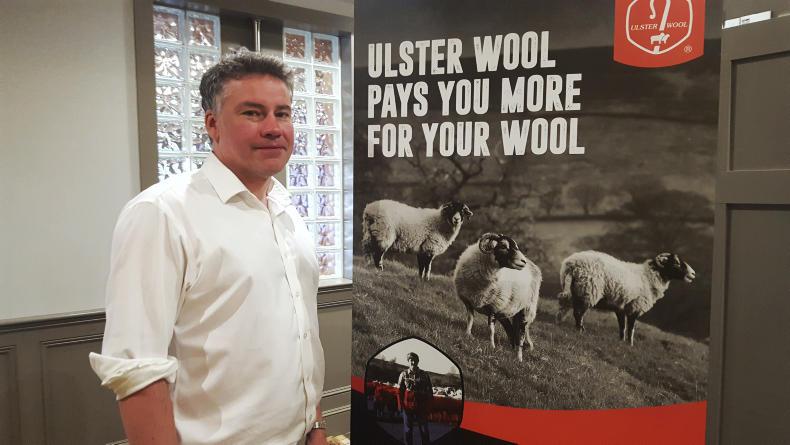Merchants who buy wool directly from NI sheep farmers at a spot price, were roundly criticised by representatives from Ulster Wool at an event in Ballycastle on Tuesday evening.
The organisation has been on a drive in recent months to get more NI sheep farmers to supply it with wool.
Chair, Antrim sheep farmer Brendan Kelly, reiterated on Tuesday evening that Ulster Wool does not buy wool, but instead sells it on a farmer’s behalf. Farmers were told that some wool merchants have talked down markets in order to buy wool from them at lower prices.
The steps taken by Ulster Wool’s parent company, British Wool, to sell wool for farmers at the highest possible price were outlined, including marketing and promotion work, and strategic selling at its auctions.
New payment scheme
Kelly also noted that the organisation has set up a new payment scheme for young farmers, opened a new collection depot in Newtownstewart, and provides training courses for sheep shearers. “A question I would have for the competition is: ‘What are you doing for the industry?’” he said.
Speaking at the event, British Wool chief executive Joe Farren said Ulster Wool currently sells around 1.2m kilos of NI wool each year, equating to around half of the annual NI wool clip. He said that selling more wool through their auctions would not alter the overall supply demand balance in the market.
“The more wool that goes through us, the more producers can benefit from collective selling power,” he told farmers.
Listen to Joe Farren in our podcast below:
Farren maintained that on average, Ulster Wool pays around 30% more to farmers than merchants buying at spot prices.
Unveiling the price schedule for balance payments for the 2017 clip, he said that it was well ahead of the £0.50/kg and £0.35p/kg flat-rate prices that were paid by merchants for crossbred and Blackface wool, respectively.
Although average prices for the 2017 clip are down on the previous year across the main grades, Farren said that prices for crossbred wool have stabilised with slight price increases recorded at recent auctions.
“For the next 12 months we might see some gentle price appreciation. Our prices usually trail New Zealand by around 20% to 25% but we have now closed the gap and are trading in line with them,” he said.
Read more
Wool prices down for 2017/18 season
British Wool re-brands as Ulster Wool
Merchants who buy wool directly from NI sheep farmers at a spot price, were roundly criticised by representatives from Ulster Wool at an event in Ballycastle on Tuesday evening.
The organisation has been on a drive in recent months to get more NI sheep farmers to supply it with wool.
Chair, Antrim sheep farmer Brendan Kelly, reiterated on Tuesday evening that Ulster Wool does not buy wool, but instead sells it on a farmer’s behalf. Farmers were told that some wool merchants have talked down markets in order to buy wool from them at lower prices.
The steps taken by Ulster Wool’s parent company, British Wool, to sell wool for farmers at the highest possible price were outlined, including marketing and promotion work, and strategic selling at its auctions.
New payment scheme
Kelly also noted that the organisation has set up a new payment scheme for young farmers, opened a new collection depot in Newtownstewart, and provides training courses for sheep shearers. “A question I would have for the competition is: ‘What are you doing for the industry?’” he said.
Speaking at the event, British Wool chief executive Joe Farren said Ulster Wool currently sells around 1.2m kilos of NI wool each year, equating to around half of the annual NI wool clip. He said that selling more wool through their auctions would not alter the overall supply demand balance in the market.
“The more wool that goes through us, the more producers can benefit from collective selling power,” he told farmers.
Listen to Joe Farren in our podcast below:
Farren maintained that on average, Ulster Wool pays around 30% more to farmers than merchants buying at spot prices.
Unveiling the price schedule for balance payments for the 2017 clip, he said that it was well ahead of the £0.50/kg and £0.35p/kg flat-rate prices that were paid by merchants for crossbred and Blackface wool, respectively.
Although average prices for the 2017 clip are down on the previous year across the main grades, Farren said that prices for crossbred wool have stabilised with slight price increases recorded at recent auctions.
“For the next 12 months we might see some gentle price appreciation. Our prices usually trail New Zealand by around 20% to 25% but we have now closed the gap and are trading in line with them,” he said.
Read more
Wool prices down for 2017/18 season
British Wool re-brands as Ulster Wool






 This is a subscriber-only article
This is a subscriber-only article









SHARING OPTIONS: